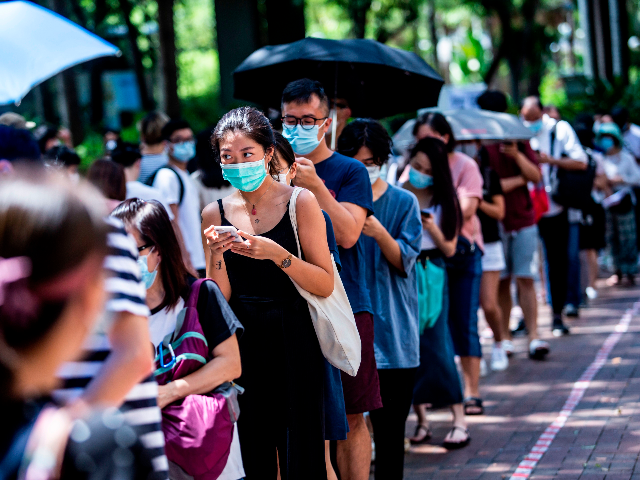Chinese state media on Sunday blamed the massive turnout for pro-democracy candidates last week, and protests held on July 1 against the tyrannical national security law imposed by Beijing, for the current surge in coronavirus cases in the city.
Hong Kong doctors, on the other hand, pointed to a list of exemptions to quarantine procedures the government issued as a more likely cause.
Over 600,000 votes were cast in the voluntary primary for pro-democracy candidates on the weekend of July 11. Most of the votes were submitted electronically, but the in-person turnout was still impressive given the heavy atmosphere of oppression settling over the city. As organizers of the vote pointed out, a huge number of Hong Kongers were willing to cast ballots even after the city’s Beijing-controlled government made it known that voting might be punished as an act of sedition under the new security law.
On Sunday, China’s state-run Xinhua news service editorialized that the timing of the democratic primaries coincided with the surge of coronavirus cases in Hong Kong.
The timing is actually a week or two off, according to the medical science that China claims to lead the world in, but Xinhua picked a few conveniently-located diagnoses and quoted some pro-Beijing politicians to make its case. As the Hong Kong Free Press (HKFP) summarized:
[Xinhua] criticised the organisers for setting up more than 250 polling stations across the city amid Covid-19 fears. They cited an unnamed person who said one of the voting venues was only one street away from the Tuen Mun Eye Centre, where three clerks were confirmed to have the virus on Saturday.
Joe Lai of pro-Beijing party DAB told the agency that areas in Kowloon East had been hit hard by the outbreak because of the primary election: “This is absolutely irresponsible behaviour, it must be severely condemned.”
Xinhua also laid blame on the protest against the Beijing-enacted national security law on July 1, when thousands of Hongkongers defied a police ban to march in Causeway Bay and Wan Chai.
“They disregarded the lives and safety of citizens to gather crowds for political gain multiple times, and created the biggest loophole in the anti-epidemic efforts,” the article read.
But as the HKFP pointed out, a far more likely source of infection was a pro-Beijing banquet held on July 9 that featured at least forty unmasked participants celebrating the imposition of the national security law.
Top Hong Kong epidemiologists have also cited the government’s tendency to issue quarantine exemptions to inbound travelers from China – including truck drivers, air crews, visiting government officials, and the employees of important Chinese corporations. The experts think they have a suspect for Patient Zero in the new Hong Kong outbreak, a taxi driver who ferried arrivals from the airport to destinations across the city.
“There is a loophole on the borders, and some infected persons may enter the city. These loopholes have been pointed out before, but it was not improved,” infectious disease expert David Hui of the Chinese University of Hong Kong lamented.
Undeterred by threats of arrest and blame-shifting for the coronavirus surge, famed democracy activist and youth leader Joshua Wong filed paperwork on Monday to run for a seat in the Hong Kong legislature.
Beijing is threatening to arrest the participants in the July 11 primary for “subversion” under the national security law, or at least disqualify them from running for office, but Wong and the other primary winners said they would forge ahead with their candidacies.
“With the threat of being extradited to China, with the uncertainty of being sent to a black jail in Beijing, with the possibility of facing a life sentence … I still hope to receive people’s mandate and let the world know that we will continue to fight until our last breath,” Wong said at a press conference on Monday.
Wong, 23, knows the odds are stacked against him, because he was barred from standing for election just last year, on the grounds that his campaign platform amounted to a call for secession from Communist China. He has also been jailed twice for participating in protest marches. Under the security law, he could be charged with a crime just for seeking office, even though he insists his call for greater autonomy is not a demand for secession.
Wong felt differently at the end of June, when he said Beijing’s security law “marks the end of Hong Kong that the world knew before” and announced he was retiring from Demosisto, the pro-democracy party he founded.
“From now on, Hong Kong enters a new era of reign of terror, just like Taiwan’s White Terror, with arbitrary prosecutions, black jails, secret trials, forced confessions, media clampdowns and political censorship,” he warned at the time.
On Monday, Wong painted his candidacy for the legislature as a gesture of defiance. “We hope to let the world know how we choose not to surrender, how we choose not to kowtow to China,” he said.
Wong and several other opposition candidates on Saturday refused to sign a pledge of allegiance to the city government, a pointed act of defiance that could be invoked as a reason to disqualify them all.
“As a [previously] disqualified runner, I know very well that whether Beijing approves me to run or not does not hinge on whether I have signed the form. It is instead a matter of national policy and diplomacy. Signing or not will not affect my chances of getting candidacy approved,” Wong said.

COMMENTS
Please let us know if you're having issues with commenting.